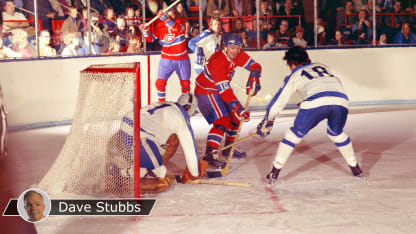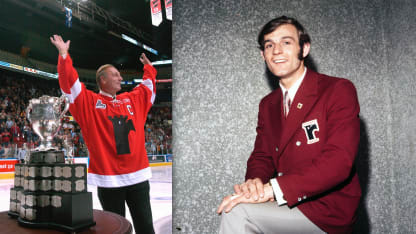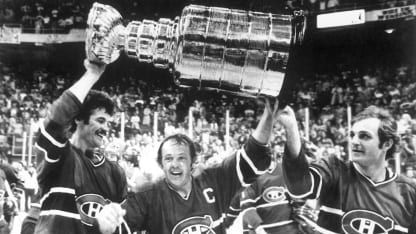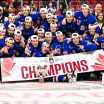Lafleur became Canadiens legend despite intense early pressure
Bowman watched forward fight through weight of expectations as Beliveau replacement to become superstar

Lafleur died Friday at the age of 70 following a 31-month battle with lung cancer.
Mourning the death of one of the most thrilling players in NHL history, a brilliant forward on his five Stanley Cup-coached champions through the 1970s, Bowman still is a little in disbelief that Lafleur didn't merely survive Montreal's hockey cauldron but would come to thrive in it.
Bowman coached Lafleur, a native of Thurso, Quebec, from his first face-off through his glorious prime, for 603 of his of his 961 regular-season games with the Canadiens between 1971-79, and for 98 of his 128 games in the Stanley Cup Playoffs between 1972-79.
Canadiens coach Scotty Bowman, just to the right of the Stanley Cup, on Montreal City Hall steps following the team's 1973 championship win. Serge Savard is on the other side of the Cup, with trainer Eddy Palchak, Guy Lafleur and Ken Dryden behind Bowman.
Coach and forward arrived with the Canadiens within hours of each other, Bowman introduced as Al MacNeil's successor June 10, 1971, the same day the draft was held in the ballroom of Montreal's Queen Elizabeth Hotel.
That morning, the Canadiens were put up for sale by brothers David, William and Peter Molson, 24 hours after the legendary
Jean Beliveau
had announced his retirement following an 18-season career with Montreal that saw him win the Stanley Cup 10 times, five as captain.
Lafleur had lit up the Quebec Major Junior Hockey League during two seasons with the Quebec Remparts, scoring 103 goals in 1969-70 and 130 the following season while leading Quebec to the 1971 Memorial Cup championship. If the Canadiens selected him in the draft that spring, as seemed virtually certain, the expectation of some was that he immediately would fill the skates of Beliveau.
The Canadiens, fans believed, were landing a French-Canadian superstar to pick up where their illustrious, freshly retired captain had left off, and eight-time champion
Maurice "Rocket" Richard
had sparkled before him.
Bowman just shakes his head at the absurd notion.
The 1970-71 Quebec Remparts, winners of the Memorial Cup as the top junior team in Canada. Captain Guy Lafleur sits in the middle of the front row.
"Everyone was expecting Guy to replace Jean, which was impossible," Bowman said. "Where were you going to get a player like Jean Beliveau? The Rocket had won five Cups in a row (1956-60). Beliveau had played with him for seven seasons, from his arrival in 1953. So when Rocket retired in 1960, Beliveau had been there a good while. Everyone knew he was Rocket's heir apparent.
"But when Guy arrived, Beliveau had just retired. And he was joining a team that had just won the 1971] Stanley Cup, upsetting the [Boston] Bruins, then the [Chicago] Blackhawks. Guy was just 20, and he knew that many wanted the Canadiens to draft
[Marcel Dionne
(a fellow French-Canadian sniper who went No. 2 to the Detroit Red Wings)."
Lafleur had done most of his scoring from right wing during his final season with Quebec, but the way the defending Cup-champion Canadiens were built, he began his career at center. The move didn't help his adjustment to the NHL.
"I'm a zero on face-offs but the coach says I'll learn," Lafleur joked at the start.
The pressure on the 20-year-old rookie, Bowman said, was tremendous.
"Guy was going up against established centers like Phil Esposito, Jean Ratelle and Stan Mikita," Bowman said. "Dionne had gone to Detroit, a weaker team, and he was playing all kind of minutes with good players, picking up points right and left."

Guy Lafleur, with the Memorial Cup, salutes cheering fans in Quebec in 2009, and in a portrait as a member of the Quebec Remparts in 1970-71, his final season before being drafted by the Montreal Canadiens.
Forward
Richard Martin
, a native of Montreal-district Verdun, was chosen No. 5 by the Buffalo Sabres in the 1971 draft and would find great success on the French Connection line with
Gilbert Perreault
and
Rene Robert
, who arrived by trade late in 1971-72.
"Martin got on with Perreault and Robert and they clicked right away," Bowman recalled.
Impatient fans brayed at Lafleur through his first three seasons of 29, 28 and 21 goals, a bit of heat taken off his individual statistics by the Canadiens' 1973 Stanley Cup win.
But Lafleur caught fire upon shedding his helmet to begin 1974-75, his fourth season. It was his first of six consecutive seasons of 50 or more goals and 100 or more points. He won the Art Ross Trophy as the top point scorer in the NHL for three straight seasons, 1975-76 through 1977-78.
Bowman was as dazzled as anyone by Lafleur's magic touch. But he had a privileged point of view, from behind the bench and on the practice rink.

Montreal Canadiens captain Yvan Cournoyer with Guy Lafleur (r.) and Yvon Lambert after the team won the 1978 Stanley Cup in Boston, Montreal's third of four consecutive championships.
"Guy was very quiet, and when he began he didn't act like he was coming in to take over," Bowman said. "It was a tough time for him, but he got into the rhythm after a while. He liked to go on the ice 15, 20 minutes before practice by himself and skate around and take shots. He liked to be alone.
"He was very good in practice. He wasn't playing 20 minutes a game his first two or three years; there wasn't enough ice time to go around. But he'd practice hard. A player doesn't do what he did without doing a lot of it on his own. He didn't need anyone to teach him. He had a natural ability to shoot and pass, but he just didn't have the experience the first couple of years.
"Guy scored goals from everywhere. There wasn't just one way that he'd score. He could pick corners, he had the ability to make plays and score. He might have been a natural center; not only could he carry the puck, but he could make plays. He didn't need much room or much time and fortunately he stayed fairly healthy. Guy was a premier player, both as a scorer and a playmaker, and his scoring at crucial times was top notch."
Indeed, Lafleur is the Canadiens' all-time leader with 94 game-winning goals.
"I don't think any other player would have had the fanfare and the pressure that Guy had coming into Montreal in 1971," Bowman said. "In his prime, winning scoring championships and winning multiple Stanley Cups, he was one of the very rare special attractions who fans in any city would pay to watch."
Photos:Hockey Hall of Fame; Getty Images

















